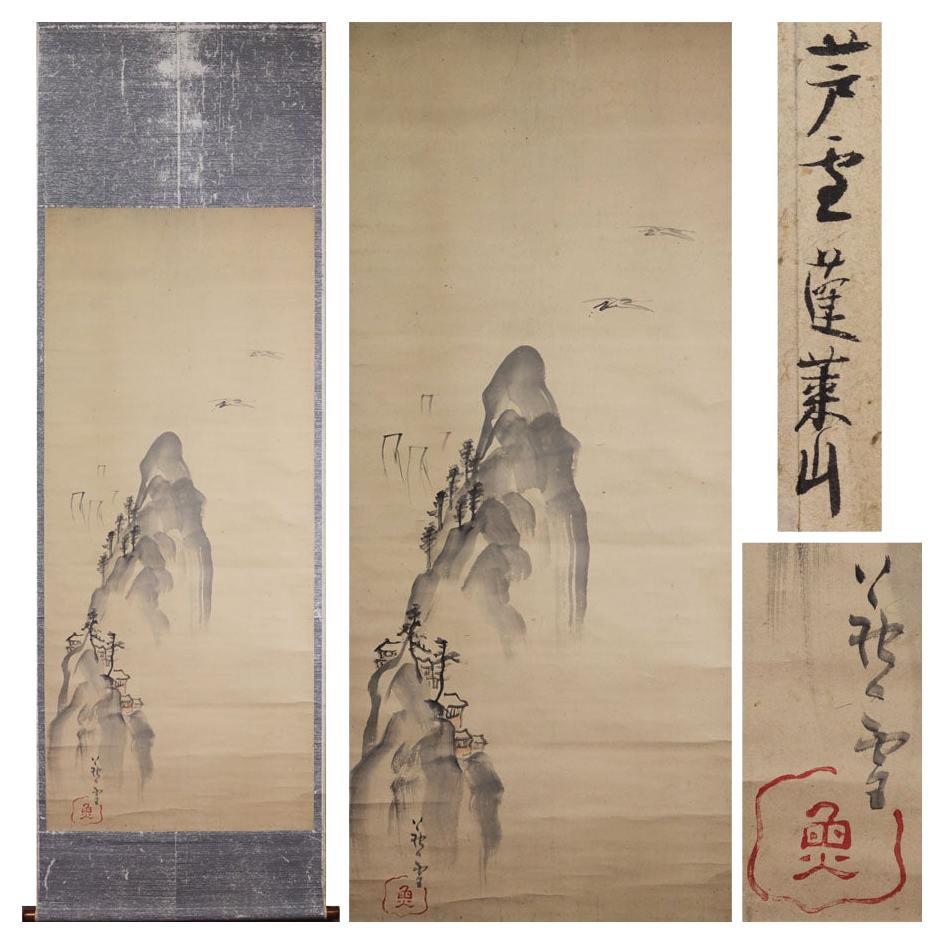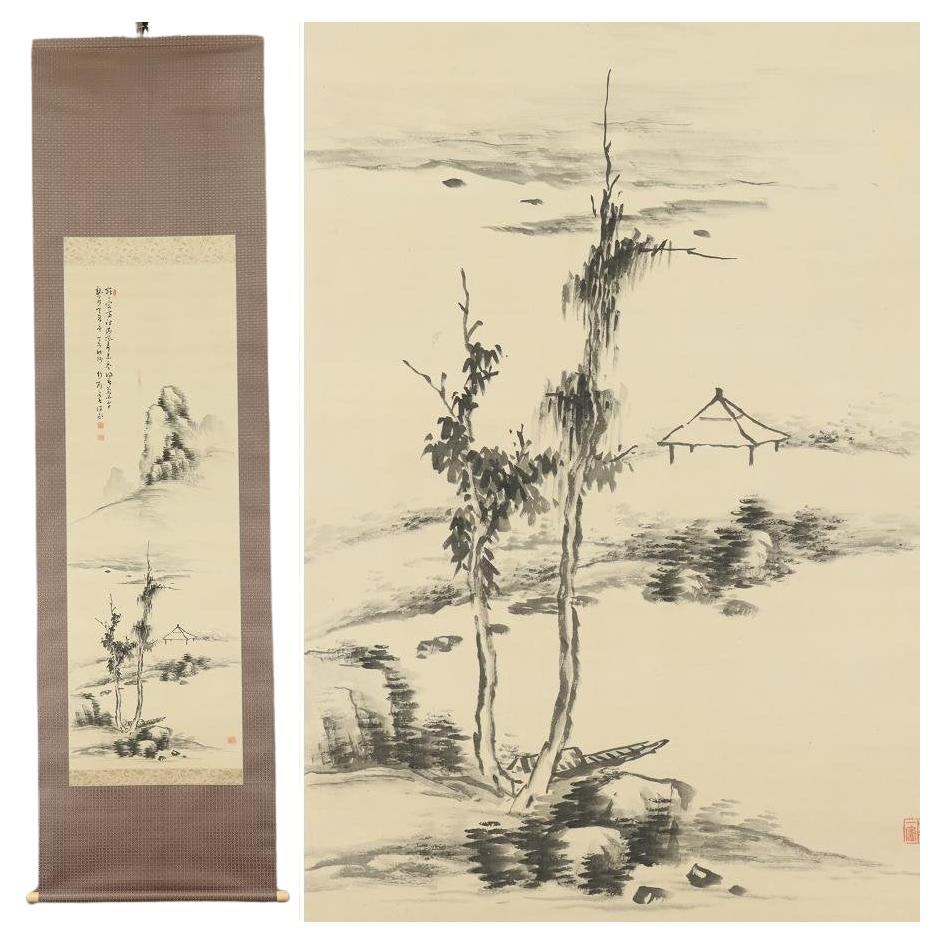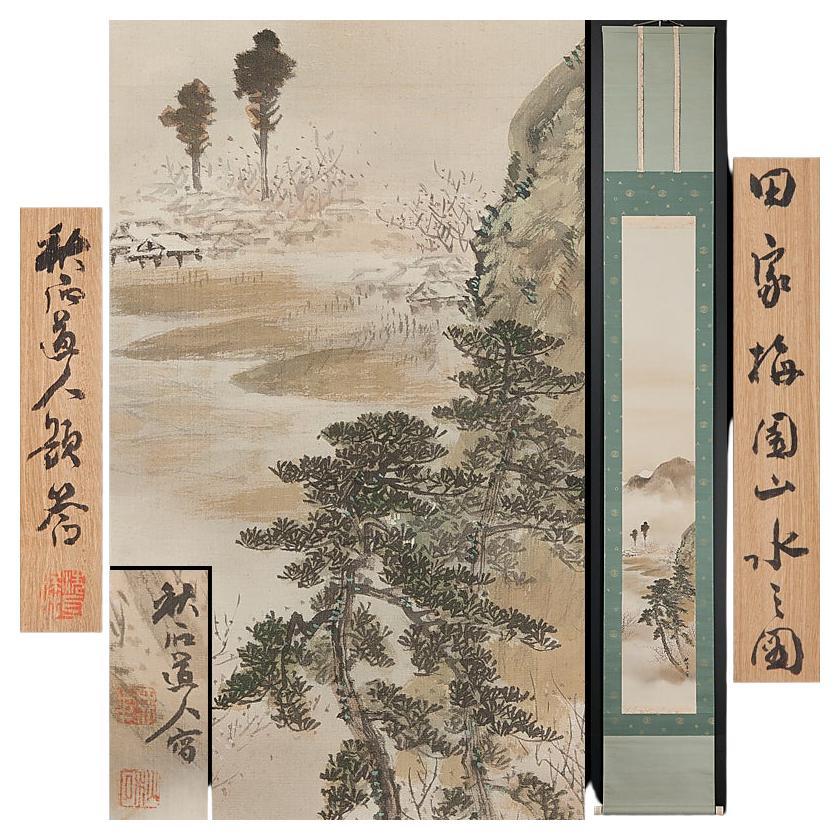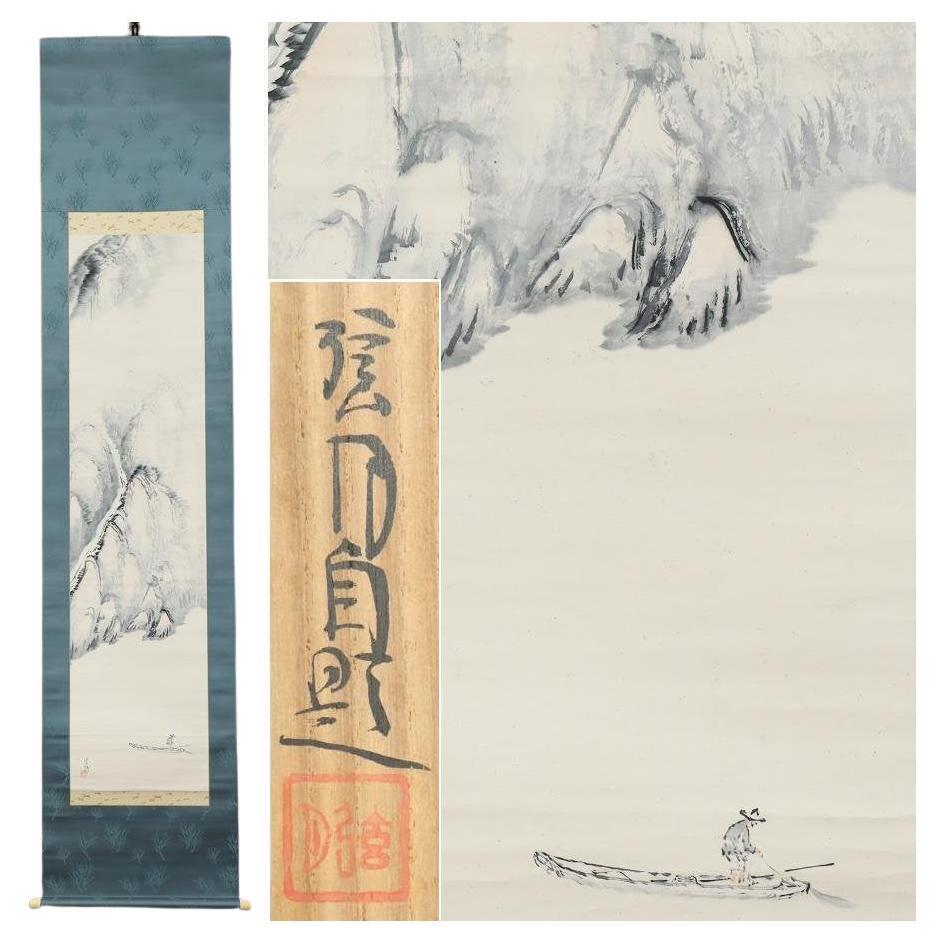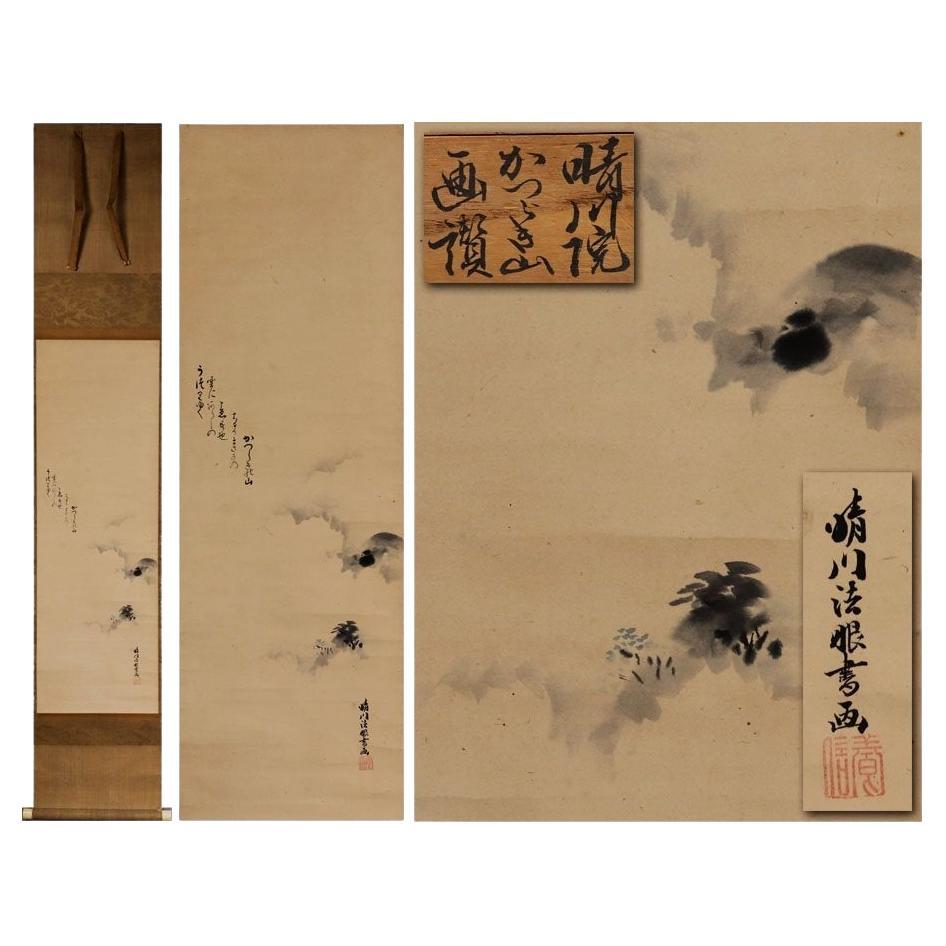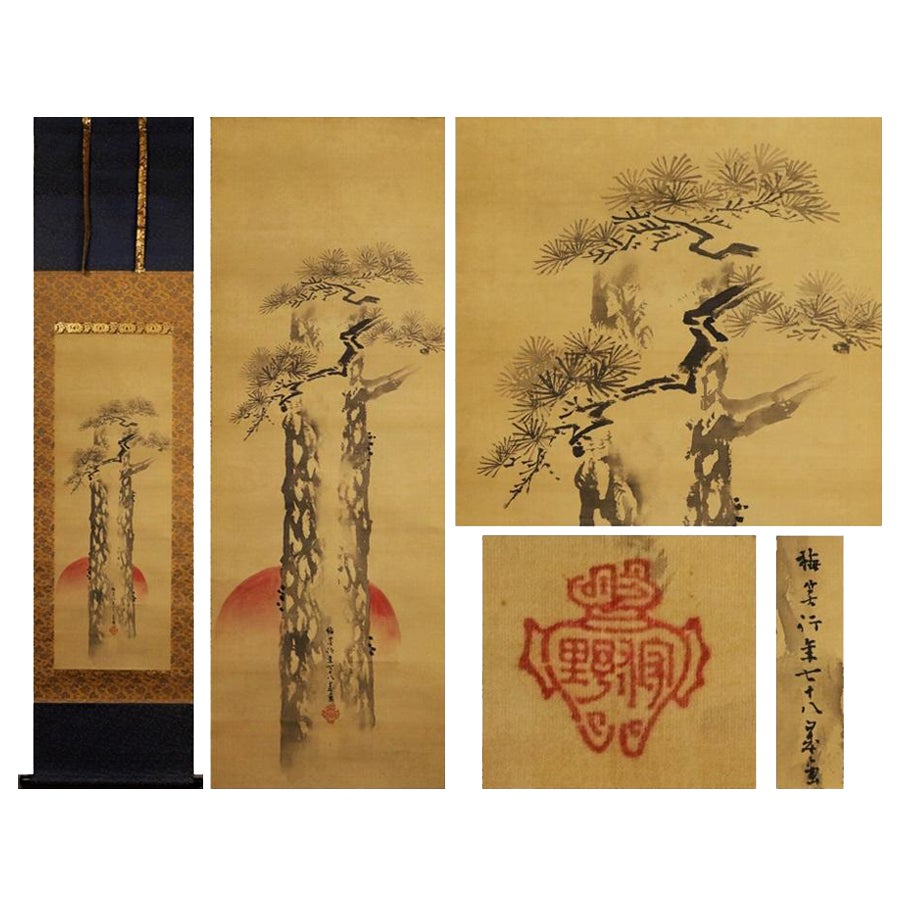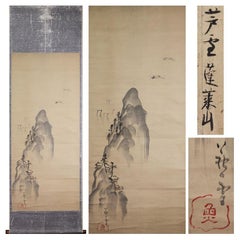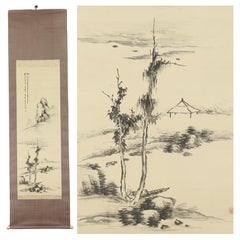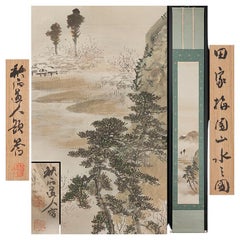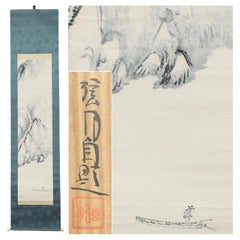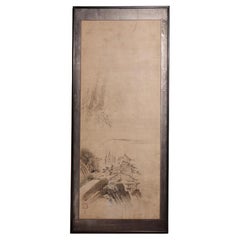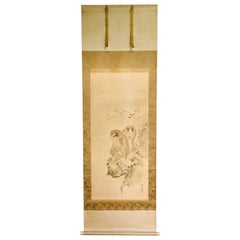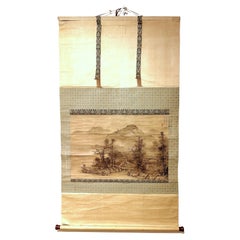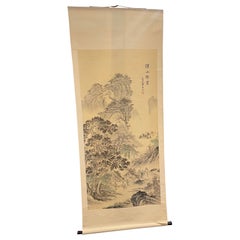Items Similar to Japanese Painting 18c Edo Scroll Chikuseki Nagamachi Nihonga Landscape Painting
Want more images or videos?
Request additional images or videos from the seller
1 of 13
Japanese Painting 18c Edo Scroll Chikuseki Nagamachi Nihonga Landscape Painting
$1,804.81
$2,256.0120% Off
£1,344.02
£1,680.0320% Off
€1,518.40
€1,89820% Off
CA$2,491.79
CA$3,114.7320% Off
A$2,762.51
A$3,453.1420% Off
CHF 1,451.81
CHF 1,814.7620% Off
MX$33,808.62
MX$42,260.7820% Off
NOK 18,131.61
NOK 22,664.5120% Off
SEK 17,018.33
SEK 21,272.9120% Off
DKK 11,560.59
DKK 14,450.7420% Off
About the Item
[Authentic Artwork] ◆ Nagamachi Chikuseki ◆ Landscape ◆ Edo Period ◆ Mitsuishi Origin ◆ Kagawa Prefecture ◆ Handwritten ◆ Paperback ◆ Hanging Scroll ◆ k891 ◆ Nagamachi Chikuseki
Explore the artistry of Chikuseki Nagamachi in this piece titled "Landscape," dating back to the Edo period and originating from Mitsuishi in Kagawa Prefecture. Handcrafted on paper, this artwork showcases Nagamachi Chikuseki's skill in landscape painting.
Chikuseki Nagamachi (1757-1806), also known as Ki Huitake or Tokubei, learned the art of landscape painting under Ryobukuro Takebe. Recognized alongside Noro Kai-seki and So-Aiseki as the "Three Stones," he was part of the Nan-ga school, focusing on Chinese-inspired landscape painting. Nagamachi had close ties with artists such as Ike Taiga and Sen Unsen, shaping his artistic perspective.
This piece, drawn by hand on paper, comes in a combined box. While the paper has some small stains, wrinkles, curls, insect licking, and creases, it's generally in good condition. The cover also has some small stains, wrinkles, and creases but remains in good shape.
Rest assured, this is an authentic piece. Bid accordingly.
Dimensions:
Approximately [height 190cm x width 65cm / (main paper) 119cm x 48cm]
- Dimensions:Height: 74.81 in (190 cm)Width: 25.6 in (65 cm)Depth: 0.04 in (1 mm)
- Style:Edo (Of the Period)
- Materials and Techniques:
- Period:
- Date of Manufacture:1780
- Condition:Wear consistent with age and use.
- Seller Location:Amsterdam, NL
- Reference Number:Seller: 1001stDibs: LU4863237088882
About the Seller
5.0
Gold Seller
Premium sellers maintaining a 4.3+ rating and 24-hour response times
Established in 2015
1stDibs seller since 2019
268 sales on 1stDibs
Typical response time: 6 hours
- ShippingRetrieving quote...Shipping from: Amsterdam, Netherlands
- Return Policy
Authenticity Guarantee
In the unlikely event there’s an issue with an item’s authenticity, contact us within 1 year for a full refund. DetailsMoney-Back Guarantee
If your item is not as described, is damaged in transit, or does not arrive, contact us within 7 days for a full refund. Details24-Hour Cancellation
You have a 24-hour grace period in which to reconsider your purchase, with no questions asked.Vetted Professional Sellers
Our world-class sellers must adhere to strict standards for service and quality, maintaining the integrity of our listings.Price-Match Guarantee
If you find that a seller listed the same item for a lower price elsewhere, we’ll match it.Trusted Global Delivery
Our best-in-class carrier network provides specialized shipping options worldwide, including custom delivery.More From This Seller
View AllAntique Japanese 18th c Edo Scroll Rosetsu Nagasawa Nihonga Landscape Painting
Located in Amsterdam, Noord Holland
The following is a work of art depicting the ``Horai Landscape,'' a land of peach, created by the master artist
[Rosetsu Nagasawa]
A painter from the late Edo period.
There are conf...
Category
Antique 18th Century Edo Paintings
Materials
Silk
$1,519 Sale Price
20% Off
Japanese Nihonga Painting 19th Meiji Scroll Tajika Chikuson Landscape Nanga
Located in Amsterdam, Noord Holland
[Authentic Artwork] ◆ Chikuson Tajika ◆ Autumn Landscape ◆ Master: Naoiri Tanomura ◆ Oita Prefecture ◆ Hand-Painted ◆ Silk Mounted ◆ Hanging Scroll ◆
Delve into the artistry of Chik...
Category
Antique 19th Century Edo Paintings
Materials
Silk
$1,139 Sale Price
20% Off
Japanese Nihonga Painting 1900 Meiji/Taisho Scroll Shûseki, Okutani Landscape
Located in Amsterdam, Noord Holland
Susheki Okutani "Takaya Plum Garden Landscape"
Silk, Colored, Authentic, Hanging Scroll, , Double Box
size Axis: Height 206.5cm Width 29.3cm
Drawing…Height 126.7cm Width 19.5cm *There may be slight differences in dimensions. Thank you for your understanding.
situation It is in good condition, but please note that there are some light stains.
Please check the image for details.
Thank you for your support.
Biography Akishi Okutani
Japanese painter. Born in Osaka. His name is Tsunejiro. He studied under Kansai Mori. From an early age, he exhibited his works at the Japan Painting Association and the Young People's Painting Association, which was led by Gaho Hashimoto and Gyokusho Kawabata, and won numerous awards. He also opened a private school...
Category
20th Century Taisho Paintings
Materials
Silk
$1,709 Sale Price
20% Off
Japanese Painting Taisho / Showa Period Scroll by Yazawa Gengetsu Landscape
Located in Amsterdam, Noord Holland
[Authentic work] ◆ Gengetsu Yazawa ◆ Mountain and Lake Off Day ◆ box ◆ Landscape ◆ Nagano Prefecture ◆ Handwritten ◆ Paperback ◆ Hanging scroll ◆
Gengetsu Yazawa
Art yearbook appr...
Category
Vintage 1930s Taisho Paintings
Materials
Silk
$1,795 Sale Price
20% Off
Lovely Japanese 18/19th c Edo Scroll Kano Osanobu Nihonga Painting Mountain
Located in Amsterdam, Noord Holland
Kano Osanobu (狩野養信)
Osanobu Kano (born August 18, 1796; died June 12, 1846) was the ninth painter of the Kobikicho Kano School in the Edo period. His common name was Shozaburo. His father was Naganobu KANO, and Tadanobu KANO was his son. His Go (pen name) was Osanobu Seisenin, Kaishinsai, and Gyokusen.
Brief Personal History
He was born the eldest son of Naganobu ISENIN during the Edo period. He was first sent to serve at Edo Castle at the age of 15, and it appears that he was apparently pushed by his father to perform various public tasks for the Kanon School. He kept a diary for 36 years, starting from the day before he first went into service at Edo Castle until the day before he died. The diary is entitles "Official Service Diary" (it consists of 52 volumes that are maintained at the Tokyo National Museum, and 4 volumes that are separately maintained at the different families), and have become the focus of a lot of attention in recent years for the detailed information they present on the daily life and work of a prestigious official painter. The reading of the characters of his name was originally "Takenobu"; however, with the birth of the first son of the Shongun Ieyoshi TOKUGAWA in 1813, whose name was Takechiyo, having a sylable with the same pronunciation of "Take"was deemed to be inappropriate, and was therefore changed to "Osanobu". Because Takenobu died the following year, after which he was referred to as Gyokujuin, Osanobu changed his pen name Gyokusen he had used until that point to Seisenin, in order to avoid using the same Chinese charcter pronounced alike. In 1819, he attained the second highest rank for a Buddhist priest, Hogen, and assumed the role of head of the family after his father passed away in 1828. In 1834 he attained the highest rank for a Buddhist priest, Hoin. He oversaw the rennovation of the wall paintings of Nishinomaru Palace of Edo Castle from 1838 to 1839, and Honmaru Palace of it from 1844 to 1846. It is thought that Osanobu later died due to the fatigue...
Category
Antique 18th Century Edo Paintings
Materials
Silk
$1,709 Sale Price
20% Off
Antique Japanese 18th c Edo Scroll [Kano Baisho Nihonga Landscape Painting
Located in Amsterdam, Noord Holland
This is a ``Rising Sun and Pine Tree'' drawn by Kano Baisho.
It is an item with a solemn taste and presence, and I think it would be a good idea to display it at New Year's, the fir...
Category
Antique 18th Century Edo Paintings
Materials
Silk
$3,421 Sale Price
20% Off
You May Also Like
Antique Japanese Suibokuga Landscape by Kano Tokinobu, 17th century.
Located in Point Richmond, CA
Antique Japanese Suibokuga Landscape by Kano Tokinobu, 17th century. A sumi-e ink on paper painting illustrating a rocky seaside landscape containing buildings, vegetation and ship masts. The painting with 3 vermillion seals of the artist in the lower left corner. Japanese dry mount paper on a wood frame with thin brocade border silver leafed surround and lacquered wood outer frame.
Condition: Lighter discoloration near the bottom of the painting, various paper restorations, other minor signs of age, wear, stains, otherwise fine condition.
Age: Painting Edo Period, circa 1670. Mounting circa 1985.
Image: 51-1/2 in. x 20-1/2 in. (131cm x 52cm)
Frame: 59-1/4 in. x 25-1/4 in. (150cm x 64cm)
Weight: 6 lbs.
Provenance:
with Honeychurch Antiques...
Category
Antique 1670s Japanese Edo Paintings and Screens
Materials
Paper
Japanese Silk Scroll Painting of Moneys Edo Period Mori Tetsuzan
Located in Atlanta, GA
A Japanese mounted vertical hanging scroll painting by Mori Tetsuzan (Japanese, 1775-1841) circa 19th century Edo period. The watercolor and ink on silk ...
Category
Antique 19th Century Japanese Japonisme Paintings and Screens
Materials
Silk, Paper
Japanese Landscape Painting, Hanging Scroll Painting
Located in Greenwich, CT
Japanese scroll painting of landscape painting depicted village along the riverside in the mountains with fisherman
Ink and color on silk
Overall size...
Category
Antique 19th Century Japanese Paintings and Screens
Materials
Silk
$1,800 Sale Price
35% Off
Japanese Scroll Hand Painting in Black Ink of a Landscape, Early 20th Century
Located in Savannah, GA
Japanese Scroll Hand Painting in Black Ink of a Landscape, Early 20th Century
Category
Early 20th Century Japanese Paintings and Screens
Materials
Paper
Japanese Painting of Mountain and village, Hanging Scroll
Located in Greenwich, CT
Japanese scroll painting depicted village in the mountain
Ink and paper. Artist signed
Overall size: 43" height. 21" width
Image size: 10.8" height. 16" width
I am planning to re...
Category
Vintage 1940s Japanese Paintings and Screens
Materials
Paper
$600 Sale Price
29% Off
Japanese Two-Panel Screen Chinese Style Painting with Calligraphy
Located in Hudson, NY
Painting of a perforated garden stone with red bamboo growing behind. Chinese zekku poem reads, "Returning home to my grass hut on a spring evening," by the Tang-poet Qian Qi. Screen...
Category
Early 20th Century Japanese Taisho Paintings and Screens
Materials
Silk, Paper, Wood
More Ways To Browse
Japanese Wall Hanging
Japanese Scroll Landscape Painting
Japanese Hanging Scroll
Japanese Silk Wall Hanging
Silk Chinese Wall Hanging
18th Century Japanese Silk Painting
9 Drawer Chest Of Drawers
Antique Church Bell
Antique Metal Swing
Antique Rice Measure
Antique Shiva
Antique Slant Top Writing Desk
Antique Wedgwood Bowl
Art Deco Cabinet Bakelite
Art Deco Vintage Cigarette Case
Asian Black Lacquer Pearl Furniture
Asian Tall Cabinets
Blue Bohemian Crystal
